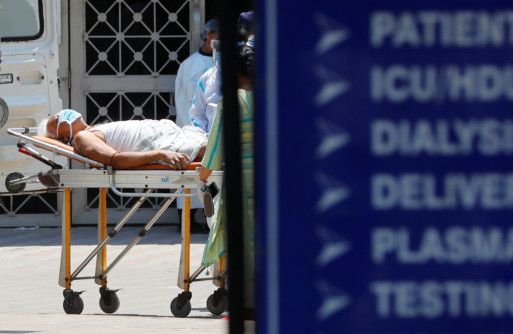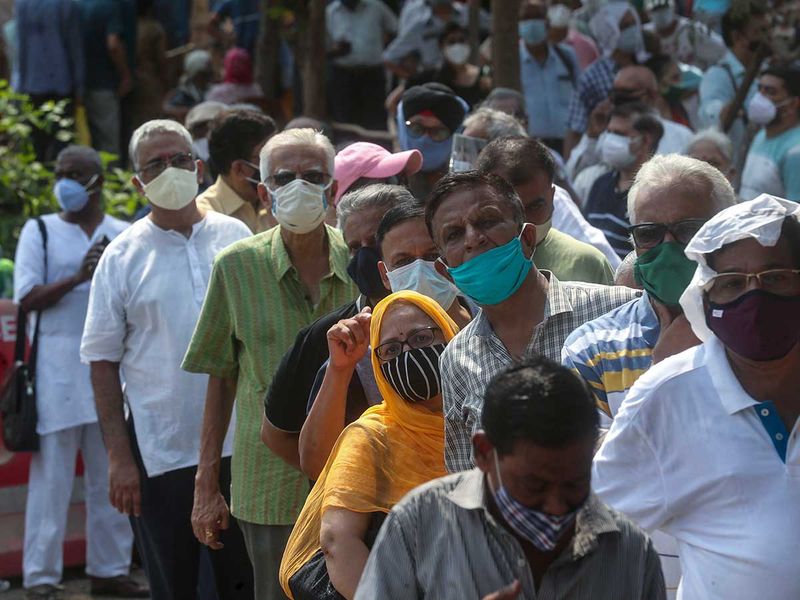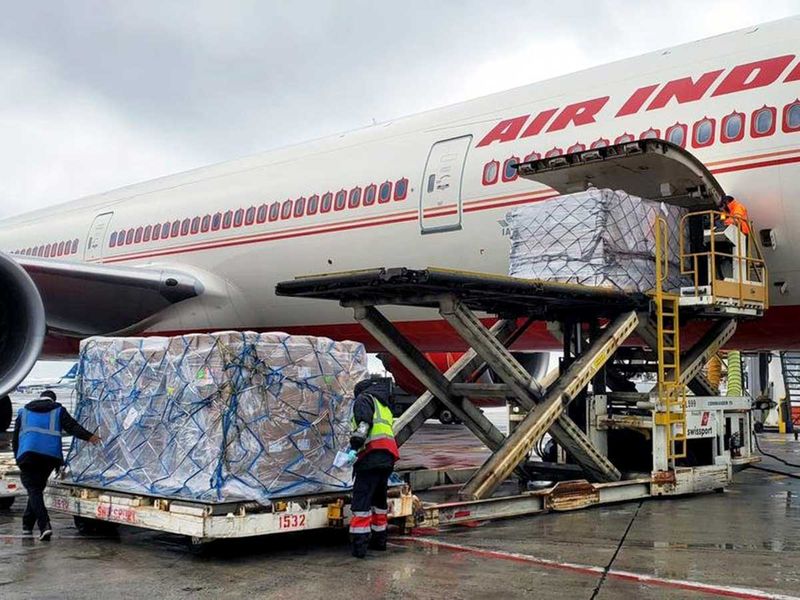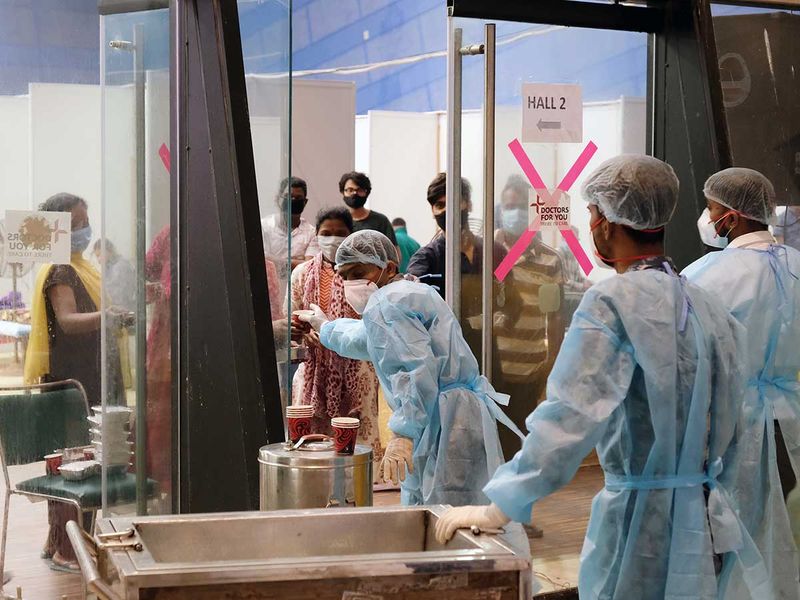India is fighting a devastating surge in COVID-19 infections that has torn through both cities and rural areas alike. Read on for the latest updates on COVID-19 in India.
Fresh spike in coronavirus cases and deaths
India reported on Thursday a record rise in coronavirus cases and deaths over the last 24 hours, with its overall caseload rising above 18 million.
With 379,257 new cases and 3,645 new deaths, India's total number of cases and deaths are now at 18.38 million and 204,832, respectively, according to health ministry data.
Updates from April 28
Grappling with an unprecedented spike in COVID-19 cases, Karnataka is facing another challenge - of tracking and tracing between 2,000 to 3,000 COVID-19 positive patients who have “gone missing”, state Revenue Minister, R. Ashoka revealed on Wednesday.
After his meeting with various department heads here, Ashoka, who is also Vice-Chairman of the Karnataka State Disaster Management Authority, told reporters that he has already directed the state police to track and trace these missing patients.
“At least 2,000 to 3,000 people in Bengaluru have gone off our radar by switching off their phones and left their houses. We don’t know where they have gone,” he admitted. Read more
Russia to deliver emergency aid
Russia will deliver emergency aid to India, President Vladimir Putin told Prime Minister Narendra Modi in a phone call Wednesday, the Kremlin said.
"Vladimir Putin expressed words of support to Narendra Modi in this difficult period in the fight against the spread of the coronavirus infection and informed him about the decision to provide India with emergency humanitarian aid," the Kremlin said in a statement.
It added that the Russian deliveries will include "20 units of equipment for the production of oxygen, 75 artificial lung ventilation devices, 150 medical monitors and 200,000 packages of medicines". The medicine packages would be favipiravir, an antiviral medication.
Biden: US rushing assistance to India
The US is rushing a whole series of help, including life-saving drugs and machinery, that India needs to combat the massive surge in Covid-19 cases, President Joe Biden has said, as he again recalled New Delhi’s assistance to America when it was in a “bind” due to the pandemic.
“We are sending immediately a whole series of help that he needs, including providing for those Remdesivir and other drugs that are able to deal with this,” Biden told reporters at a White House news conference on Tuesday. “We are sending the actual mechanical parts that are needed for the machinery they have to build a vaccine, and that is being done as well,” he said.
Trudeau: Canada to provide $10 million
Canada will provide $10 million to India to support the country in its fight against pandemic, Prime Minister Justin Trudeau announced. Addressing a press conference, Trudeau said that Minister of Foreign Affairs Marc Garneau had ‘direct conversations’ with his Indian counterpart S Jaishankar about how Canada can best help, including the donation of extra medical supplies.
New Zealand to give NZ$1m to Red Cross
New Zealand will give 1 million NZ dollars ($720,365) to the Red Cross to assist India, Foreign Minister Nanaia Mahuta announced yesterday.
"We stand in solidarity with India and commend the tireless efforts of India’s frontline medics and healthcare workers who are working hard to save lives," said Mahuta.
India declines UN’s offer of assistance
India has declined assistance offered by the United Nations of its integrated supply chain for COVID-19-related material, saying the country has a “robust system” to deal with the required logistics, a spokesperson for UN Secretary General Antonio Guterres said. “One of the things we did is we offered the assistance of our integrated supply chain if it was required. We’ve been told at this point that it’s not needed because India has a reasonably robust system to deal with this,” Farhan Haq, Deputy Spokesman for the UN Chief, said.
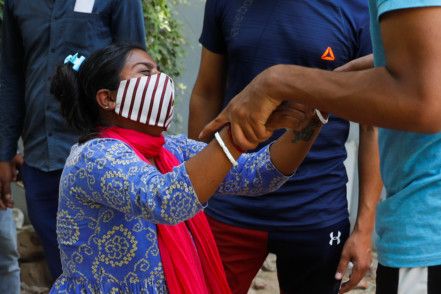 Shruti Saha, who had been waiting since Tuesday night for her turn to get an oxygen cylinder refilled for her mother, reacts after she was informed about her mother's death, outside a refilling workshop, in New Delhi.
Shruti Saha, who had been waiting since Tuesday night for her turn to get an oxygen cylinder refilled for her mother, reacts after she was informed about her mother's death, outside a refilling workshop, in New Delhi.
India’s giant IT firms in Bengaluru and other cities have set up COVID-19 “war-rooms” as they scramble to source oxygen, medicine and hospital beds for infected workers and maintain backroom operations for the world’s biggest financial firms.
Banks including Goldman Sachs and Standard Chartered, who run much of their global back office operations from large office parks in Bengaluru, Chennai or Hyderabad, have put in place infrastructure to vaccinate thousands of employees and their families when age restrictions are lifted on May 1.
Workers at huge technology service providers Accenture, Infosys and Wipro say teams are working 13-14 hours daily, under growing pressure and struggling to deliver on projects as staff call in sick and take time off to care for friends and relatives. Read more.
Help on Twitter
People in cities across India are relying on Twitter and the kindness of strangers for help during a time of national upheaval.
Some are using the platform to share locations where gas cylinders, which are in limited supply, can be refilled. Others are posting details about patients in urgent need of help. Some posts advertise which hospitals have empty beds and others ask for blood plasma donors. There are tweets that offer advice on how to stay safe and others that beg for ambulances before it is too late.
With adequate oxygen supplies and no run yet on hospital beds, Kerala has painted a distinctly different picture from some of India’s metro cities like New Delhi and Mumbai, but an acceleration in COVID-19 cases this week has triggered more caution in the state.
On Tuesday, for the first time, the number of daily fresh coronavirus cases topped 30,000, with 32,819 cases reported from the 14 districts in Kerala. Read more
Grim milestone
India crossed a grim milestone Wednesday of 200,000 people lost to the coronavirus as a devastating surge of new infections tears through the country.
The health ministry reported 3,293 daily COVID-19 deaths in the last 24 hours, bringing India's total fatalities to 201,187. The country also reported 362,757 new infections, a new global record, which raised the overall total past 17.9 million.
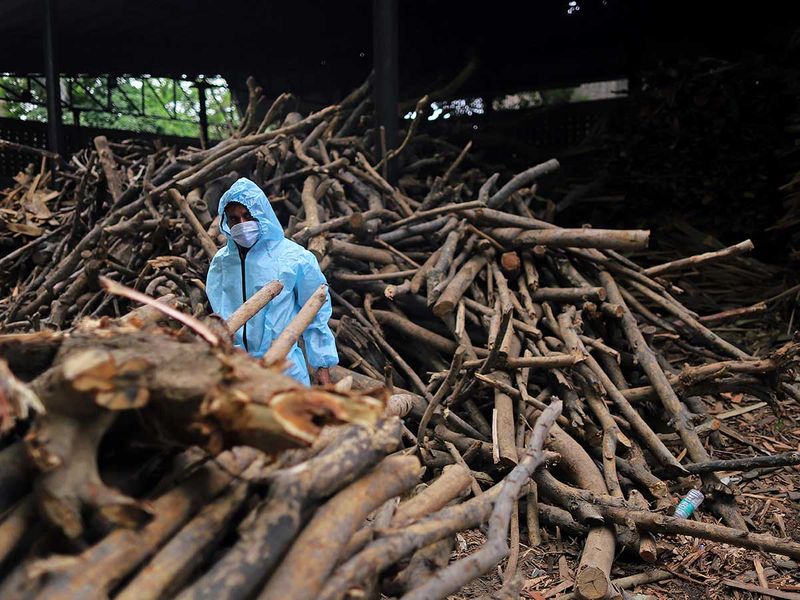 A worker wearing personal protection equipment (PPE) loads wood onto a cart at a crematorium on the outskirts of New Delhi, India, on Friday, April 23, 2021. Image Credit: Bloomberg
A worker wearing personal protection equipment (PPE) loads wood onto a cart at a crematorium on the outskirts of New Delhi, India, on Friday, April 23, 2021. Image Credit: Bloomberg
Updates from April 27
A shipment from Britain, including 100 ventilators and 95 oxygen concentrators, arrived in the capital, New Delhi, though a spokesman for Prime Minister Boris Johnson said Britain had no surplus COVID-19 vaccine doses to spare.
France is sending eight large oxygen generating plants this week and Ireland, Germany and Australia are sending oxygen concentrators and ventilators, an Indian foreign ministry official said, underlining the crucial need of oxygen.
But the crisis in the metropolis of 20 million people, the epicentre of the latest wave of infections, continued unabated. Dr K.Preetham, chief of medical administration at Delhi’s Indian Spinal Injuries Centre, said the scarcity of oxygen was the main concern.
Over the past 24 hours, India recorded 323,144 new cases, slightly below a worldwide peak of 352,991 it reached on Monday. Deaths rose by 2,771 to 197,894.
Rijo M John, a professor and health economist at the Indian Institute of Management in the southern state of Kerala, said the drop in cases was largely due to a fall in testing. “This should not be taken as an indication of falling cases, rather a matter of missing out on too many positive cases!” he said on Twitter.
The early months of this year seemed to signal a slow but sure crawl back towards its bustling days of the past for India’s tech stronghold Bengaluru, but another wave of coronavirus has dealt a debilitating blow to those hopes. Read more
India has called on its armed forces to help tackle the devastating crisis. Chief of Defence Staff General Bipin Rawat said late on Monday that oxygen would be released from armed forces reserves and retired medical personnel would join struggling health facilities.
Prime Minister Narendra Modi has urged all citizens to get vaccinated and exercise caution amid the “storm” of infections. Read more
Australia on Tuesday announced a temporary ban on direct passenger flights from India, as the South Asian nation grapples with a massive surge in coronavirus infections. Read More
 Image Credit: Graphic News
Image Credit: Graphic News
Vaccine demand outpaces supply
India, home to around 1.3 billion people, has so far reported 17.64 million COVID-19 infections, but experts believe the tally runs significantly higher.
Vaccine demand has outpaced supply in India, with companies struggling to boost output, partly because of a shortage of raw materials and a fire at a facility making the AstraZeneca shot.
India’s worst-hit state of Maharashtra, home to the financial capital Mumbai, could postpone inoculation for those between the ages of 18-45 amid supply uncertainties, a government official said.
India plans to open up vaccination to all adults from May 1.
The country is negotiating with the United States, which has said it will share 60 million doses of AstraZeneca’s COVID-19 vaccine with other countries.
“Major lobbying is on at this point of time to secure as much as possible for India,” a senior Indian official part of ongoing negotiations told Reuters, adding that Modi had been assured that India would be given priority.
Bhutan to supply liquid oxygen
Bhutan will supply life-saving liquid oxygen to India, signalling a practical manifestation of the 'uniquely close and friendly' bilateral ties, the Indian embassy in Thimphu said on Tuesday.
Every day, 40 metric tonnes of liquid oxygen produced by the oxygen plant will be exported to Assam using cryogenic tankers, the embassy said in a statement.
The liquid oxygen to India will be supplied from the new plant being set up at the Motanga Industrial Estate, Samdrup Jongkhar district by a Bhutanese company, S D Cryogenics Gases Private Limited, it said.
from World,Europe,Asia,India,Pakistan,Philipines,Oceania,Americas,Africa Feed https://ift.tt/3vxzPnr
